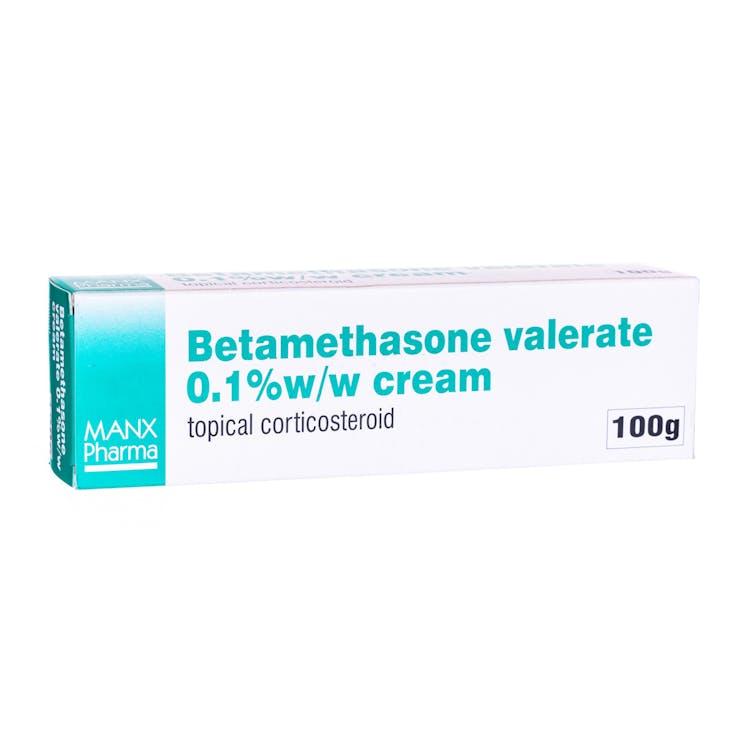- Home
- Chronic Conditions
- Eczema & Psoriasis
- Betamethasone Cream (Betamethasone Valerate)
Betamethasone Cream (Betamethasone Valerate)
Images à titre indicatif uniquement
Betamethasone cream is used for the treatment of skin inflammation. Betamethasone cream is sometimes known by the brand name of Betnovate. It is used to treat conditions including eczema, psoriasis, dermatitis, and reactions to insect bites.
- Reduces swelling, itching and redness
- Anti-inflammatory medication
- Easy application
- Genuine medication
- Shipped from EU Pharmacies
Plus d'informations
About Betamethasone Cream
- Betamethasone cream is a potent steroid cream
- Betamethasone cream is also marketed as Betnovate
- Betamethasone cream should be used sparingly for short periods of time to avoid side effects including skin thinning and scarring
- Betamethasone cream is often used in conjunction with other emollient creams to help keep skin inflammation under control
- Betamethasone cream can occasionally irritate the skin
- It is important to read the patient leaflet for a full list of side effects and cautions.
How Does Betamethasone Cream Work?
Betamethasone cream contains a potent steroid to help minimise inflammation.
When the skin is inflamed, the blood vessels dilate and inflammatory cells flood into the area. This leads to itching, redness, swelling and pain. Steroid creams such as Betamethasone help to reduce these symptoms by dampening down the body’s immune response. The inflammation begins to resolve, and the skin feels less irritated and sore.
Betamethasone cream is often prescribed when other milder steroid creams, such as hydrocortisone, have not helped.
The steroid relieves the manifestations of inflammatory skin conditions, including:
- Eczema
- Dermatitis (skin inflammation with numerous causes)
- Dermatitis caused by an allergy
- Psoriasis
- Reactions to insect bites
- Seborrheic dermatitis
- Lupus erythematosus
- Lichen simplex and lichen planus.
How is Betamethasone Cream Used?
Betamethasone cream should only be applied to the area of irritation or inflammation. Due to its potent strength, only a small amount of steroid should be applied at each application. Take note of your personalised instructions, as some people should apply Betamethasone cream more than once a day, whilst for others once is enough.
Steroid creams are often measured in ‘fingertip units’. A fingertip unit is the amount of cream you can squeeze onto the end (tip) of one finger. One fingertip unit of cream is enough to cover an area that’s twice the size of your palm, so for a small area of inflammation you need to apply very little cream.
Wash your hands first, and then apply the cream in a thin layer. Gently smooth it onto your skin, making sure you cover all of the affected area. Wash your hands afterwards so that your fingers are not exposed to the steroid unnecessarily.
Steroid creams can be applied to wet or weeping areas of skin. Avoid getting it in any cuts or broken areas of skin.
If you have very dry skin, you may be prescribed the thicker, oilier Betamethasone ointment instead. The ointment helps to trap moisture in the skin, helping to treat any dryness.
Dosage of Betamethasone Cream
Betamethasone cream comes in a strength of 0.1%. This means that every 1 gram of cream contains 1mg of betamethasone valerate.
Check the instructions to see how often you should apply Betamethasone cream. It may take a few days to notice an improvement in your skin.
Are there any Side Effects?
Like all medications, Betamethasone cream can have some side effects. The most common side effects include:
- Discomfort or a burning sensation on the skin
- Allergic skin reactions.
If you are concerned about any of these side effects, you should speak to your doctor for further advice.
Occasionally, after prolonged use of Betamethasone cream, some people will notice that their skin is thinner. Some people also develop stretch marks. The stretch marks may fade over time, but are likely to be permanent.
Serious allergic reactions happen very rarely. If you have a severe allergic reaction (anaphylaxis) including breathlessness, lip or tongue swelling, call 999 immediately.
Betamethasone Cream Warnings
You should stop using Betamethasone cream if:
- You get lighter or darker skin patches
- You start to feel very unwell with vomiting (being sick), dizziness, weakness, tiredness, mood changes, loss of appetite or diarrhoea – this could be a sign of adrenal gland problems
- You feel confused, sleepy, thirsty, hungrier than usual, pass urine frequently or notice that your breath smells sweet or fruity – this could be a sign of high blood sugar
- Your skin condition worsens, or you notice yellow fluid weeping from the skin – this could be a sign of a new or worsening infection
- You notice any changes in your eyesight.
Betamethasone Cream may not be suitable for everyone. You should tell your doctor if you:
- Have glaucoma or cataracts
- Have areas of infected eczema or a fungal skin infection
- Have ever had an allergic reaction to a skin cream, ointment, or solution
- Are pregnant, trying to conceive, or breastfeeding
Some medications can interact with Betamethasone cream. You may be advised that Betamethasone cream will not suit you if you already take another steroid cream or topical preparation.
Because Betamethasone cream may not suit everyone, we will complete a Consultation with you including a health questionnaire. This will ensure that the medication will be suitable for you.
A qualified prescriber will review your current medications, including any herbal remedies or supplements, to ensure that Betamethasone cream will not interact with them.
Once prescribed, Betamethasone cream will be ordered on your behalf via electronic prescription, allowing you to pick the medication up at your convenience.

Ici pour vous aider
Our Customer Service is available Monday to Friday 9am - 4pm. If you need urgent assistance, do not use this service. Call 111, or in an emergency call 999. Visit our help section



